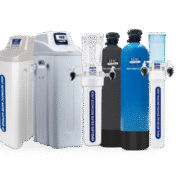Purchasing and Maintaining A Water Softener
If you have hard water in your area, a water softener should be your number one priority. The benefits of a water softener are far-reaching and go beyond removing scale buildup on appliances, and it improves water quality. However, how do you effectively buy and maintain one? Here is everything you need to know to make a good choice on water softening and keep it working its best into the future.
What is Water Softening?
Hard water contains a lot of calcium and magnesium, and therefore will lead to a series of issues that include mineral build-up on pipes, appliances, clothes, and skin. Water softening resolves these issues by removing calcium and magnesium through an ion-exchange mechanism and replacing them with sodium or potassium ions. In this way, soft water reduces soap scum, prolongs appliance life, and can even assist with skin and hair.
Choosing the Right Water Softener
When purchasing a water softener, several factors must be considered to ensure it meets your household’s needs. Here are some essential points to think about:
1. Size and Capacity
Choosing the right size for your water softener is crucial. The size determines the amount of water it can treat before needing regeneration. Consider your household’s water usage and the hardness of your water when selecting the capacity. A unit that is too small won’t be efficient, while one that’s too large may waste salt and water.
2. Type of System
There are two common types of Water Softening systems: salt-based and salt-free. Salt-based softeners are the most effective for high hardness levels, while salt-free systems use a different process, such as filtration or template-assisted crystallisation, and are better for those looking for an eco-friendly option. Both types can benefit your household depending on your water quality.
3. Installation and Maintenance
A professional installation will ensure that your water softener will work efficiently, but you can install the smaller units yourself. Regardless of how you choose to acquire your system, water softening systems require maintenance, and that will also factor into savings. Maintenance work includes cleaning the resin bed, checking salt levels, and ensuring the flushing of the system is done on a regular basis.
Maintaining Your Water Softener
Maintaining your water softener is key to ensuring that it works properly for years to come. Here are some useful tips:
1. Monitor Salt Levels Often
It’s good practice to monitor and ensure that the salt level in the water softener is at an optimal level for proper regeneration. When there are low levels of salt in the brine tank, the water softener will not function properly, leading to hard water problems.
Must Read: Top 5 Water Filters for Removing Contaminants in 2025
2. Clean the Brine Tank
Salt can cause bridges or crusts in the brine tank, which can impact the regeneration process. Regular cleanings will avoid crust build-up and run the water softener smoothly.
3. Clean the Resin Bed
Minerals, metals, and organic matter can all develop in the resin bed, which will impact the effectiveness of the water softener. From time to time, resort to a resin cleaner to keep the resin bed free from contaminants.
4. Flush the System
Once every several months, flush the water softener system. Flushing the system will help get rid of impurities and other build-up inside the water softener so it can operate as well as it can.
Additional Considerations for Clean Water
Besides having softened water, you may want to consider having a Water Dispenser to ensure you have access to clean, fresh water. A water dispenser will filter additional contaminants that a water softener may not filter to ensure both softened and purified water for drinking and cooking.
Benefits of a Water Dispenser
A water dispenser offers convenience because it provides instant distribution of cool, purified water, and some models come equipped with a filtration system, in addition to a water softener. A water dispenser can enhance the water quality for homes with hard water and provide an additional defence against the mineral deposits in water. Many people simply dislike the taste of their hard water, and using a water dispenser can help to improve the taste.
Conclusion
Buying and taking care of a water softener is a good decision for better water quality in your home. If you choose the correct water softener system, maintain your softener regularly, and consider additional options like a water dispenser, you will enjoy all the advantages of the soft, clean water supplied by your water softener. If properly taken care of and maintained, your water softening system will give you years of good value, energy cost savings, appliance protection, and healthier living.

